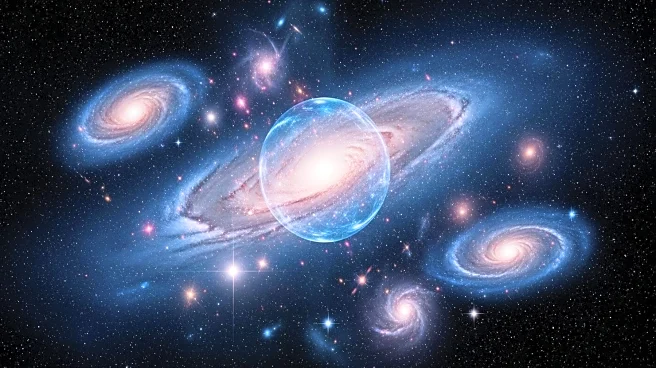What's Happening?
Researchers from the University of Chicago have proposed a new theory suggesting that Dark Energy (DE), a force believed to be responsible for the accelerated expansion of the universe, may be evolving over time. This theory challenges the traditional view that DE is constant, as posited by the Lambda Cold Dark Matter (LCDM) model. The study, conducted by Anowar J. Shajib and Joshua A. Frieman, utilized data from the Dark Energy Survey (DES) and the Dark Energy Spectroscopic Instrument (DESI) to support their hypothesis. Their findings indicate that DE's density has decreased by about 10% over the last several billion years, suggesting a dynamic nature. This research is part of a broader effort to resolve the 'Hubble Tension,' a discrepancy in measurements of cosmic expansion rates.
Why It's Important?
The evolving nature of Dark Energy could have profound implications for our understanding of the universe's future. If DE is indeed dynamic, it may alter predictions about cosmic expansion, potentially avoiding extreme scenarios like the Big Rip or Big Crunch. Instead, the universe might undergo accelerated expansion for billions of years, leading to a 'Big Freeze.' This research could reshape cosmological models and influence future studies in astrophysics. Understanding DE is crucial, as it constitutes approximately 70% of the universe's energy density, yet remains largely mysterious. The findings could guide future surveys, such as those conducted by the Vera Rubin Observatory, in determining the correct cosmological model.
What's Next?
Future surveys, including the Vera Rubin Observatory Legacy Survey of Space and Time (LSST), are expected to provide more data to test the evolving DE model. These surveys will help clarify the history and nature of cosmic expansion, potentially confirming or refuting the dynamic DE hypothesis. The results could lead to a reevaluation of the Standard LCDM model and influence the direction of cosmological research. Researchers anticipate that these surveys will offer definitive insights into whether DE is constant or evolving, shaping our understanding of the universe's fate.
Beyond the Headlines
The study raises ethical and philosophical questions about our understanding of the universe. The notion that 70% of the universe's energy density is poorly understood challenges scientific assumptions and highlights the limits of current models. This research underscores the importance of interdisciplinary collaboration in addressing complex cosmological questions. It also emphasizes the need for continued investment in advanced observational technologies to unravel the mysteries of DE and its role in cosmic evolution.










